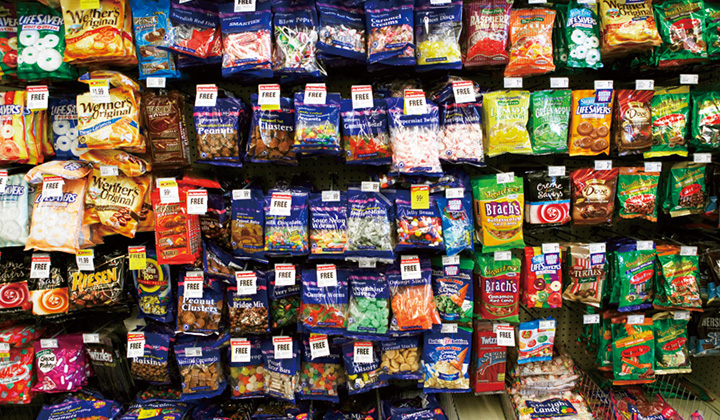Special Feature Environment-conscious Adhesives Used for Food Packaging
Adhesives used for food packaging are those adopted for the laminating process of plastic films and/or aluminum foils used as packaging materials for various kinds of food, such as snacks and vacuum-packed foods.
For the general-use food packaging materials used for snacks etc., the adhesion characteristic is mainly required, whereas, for the packaging materials used for vacuum-packed foods, various properties are required. Heat-resistant properties to allow the sterilization at high temperatures to be conducted prior to shipping or high-temperature cooking, and high-moisture resistance properties are mainly required. Solvent-type adhesives, which are used for the lamination after being diluted with a solvent, are mainly used. However, in the case of solvent-type adhesives, the release of VOC occurring at the time of dilution of the adhesive and during the drying process of the solvent thereafter is pointed out as a problem.
In order to cope with this problem, the DIC Group has developed various kinds of adhesives, including a high-solid type in which the amount of organic solvent is reduced, a water-based type for which tap water can be used, and a non-solvent type for which no dilution with a solvent is required.
An ample lineup of non-solvent type adhesives
Since the non-solvent type adhesive does not require any dilution at the time of the lamination process and thereby the process of drying the solvent out can be omitted, the VOC release can be avoided, and even a sizable amount of solvent cost can be reduced. We have obtained an approval for our Food Contact Notification submitted to the U.S. FDA and thus the safety as a food packaging adhesive is already confirmed.
DIC Graphics has prepared a product lineup that covers non-solvent-type adhesives for the range from snacks to vacuum-packed foods and the entire range of usage of solvent-type adhesives.
Special Topics before 2012

The DIC Group: Striving for a Sustainable Society Utilizing the Power of Chemistry to Solve Problems and Create New Value
Shipping, information, housing, food products—there are number of problems that need solving in the industrial fields that support our daily lifestyles. Through creative development of new products, the DIC Group is contributing to solutions for such problems while generating new value.

Placing top priority on safety, the environment and health while maximizing benefits from chemical products
While supporting customer lifestyles through our wide variety of chemical products, the DIC Group makes efforts to ensure safety, protect the environment and ensure health in every phase of the product life-cycle.

Our Efforts in Environmental Responsiveness with Printing Ink Products
Ink products not using hazardous substances (soy-oil ink and vegetable ink) of which decrease the use of petroleum-derived solvents have been developed.

Urethane Resin for Artificial Leather
In order to respond to the requirement for the decreasing of VOC inside the vehicle, we are also putting our efforts into the development of environmentally friendly products, such as toluene-free and water-based materials.

Halogen-free PPS Resin
DIC has successfully decreased the chlorine content of the PPS resin to a level lower than the requirement level, 900 ppm. Thus, DIC has completed the lineup of low-halogen PPS compounds.

Environment-conscious Adhesives Used for Food Packaging
DIC has developed various types of adhesives to prevent the release of VOC such as a high-solid type in which the amount of organic solvent is reduced, a water-based type for which tap water can be used.


